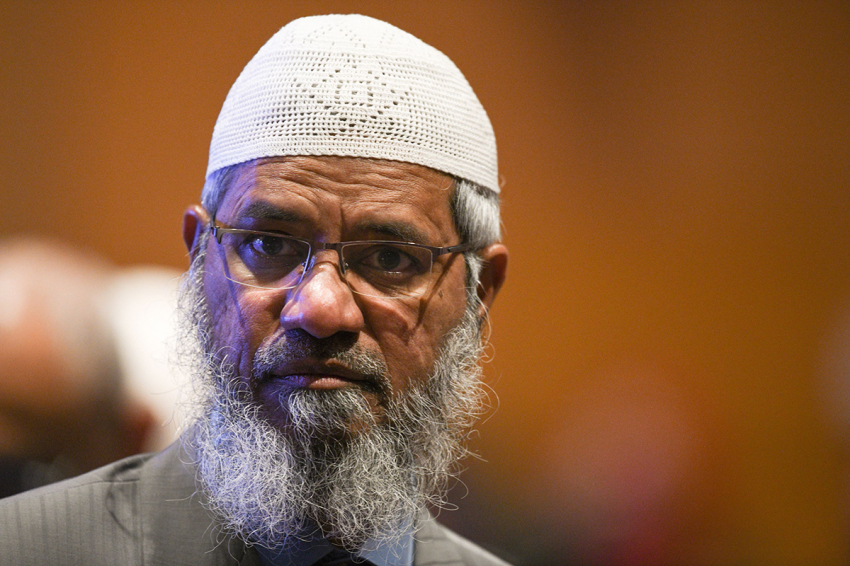Islamic preacher Zakir Naik draws Christians' ire over false claims about Christianity in Pakistan visit

Christian leaders in Pakistan have condemned Islamic preacher Zakir Naik’s objectionable remarks about Christianity during his various public sermons in Pakistan when touring the country on a month-long state-sponsored visit in October.
A prominent figure in the Islamic world, Naik is the founder of the Islamic Research Foundation and Dubai-based Peace TV that broadcasts his public speeches. An Indian citizen, the preacher has been residing in Malaysia since 2016 amid legal troubles in his home country, which has sought his extradition in a number of cases, including hate speech, incitement to terrorism and money laundering.
This year's was Naik’s first visit to Pakistan in three decades — the last time he visited the country was in 1992.
During his tour, Naik has addressed several meetings and delivered lectures in various cities, including Karachi, Lahore and Islamabad, where he has repeatedly criticized Christianity, challenged Christians to religious debates, and made them public offers to convert to Islam.
In a letter addressed to Pakistan’s President Asif Ali Zardari on Oct. 21, Azad Marshall, the president bishop of the Church of Pakistan, expressed dismay over Naik’s open criticism of Christian doctrines and sacred scriptures in public forums.
According to Marshall, Christian pastors and scholars were not provided the opportunity to respond to the “misinformation” spread during these forums. The bishop’s letter stated that the Christian community felt marginalized, and their religious beliefs were publicly discredited without recourse.
Marshall reminded President Zardari of Pakistan’s constitutional guarantees, citing Article 20, which ensures the right of every citizen to freely practice and propagate their religion. He also referenced Article 36, which obligates the state to protect the legitimate rights of minorities.
Calling for immediate action by the government at the time, the bishop said that the Christian community believed that such state-sponsored actions threatened the religious harmony and mutual respect that Pakistan’s founder, Muhammad Ali Jinnah, had envisioned in his address to the first Constituent Assembly of Pakistan.
Slamming Naik for his wrong interpretation of the Bible, his claims of alterations in the Bible, and negation of Christ’s divinity and crucifixion, the Christian Study Center’s Director, Bishop Emeritus Samuel Azariah, criticized the government for sponsoring the controversial preacher’s visit.
“They ignored his track record, arrogant attitude, and insulting behavior when cornered. Holy figures and books are not debatable; his stance is wrong,” Azariah said.
“While trying to prove his knowledge, he is building walls between communities. His visit is harmful for the followers of both Islam and Christianity,” he added.
President of the Catholic Bishops Conference of Pakistan, Bishop Samson Shukardin, said Naik’s use of derogatory terms against church leaders and evangelists was condemnable.
“We reject one-sided calls for conversions,” he added, raising concerns about the resulting “damage to interfaith harmony efforts.”
During a press conference on Oct. 16 at the Lahore Press Club, Dominican priest and interfaith dialogue promoter Father James Channan, along with leaders from Protestant churches and representatives from the Hindu, Sikh and liberal Muslim communities, called for a ban on Naik.
“He has made many statements which have caused unease among minorities. They are hurt and have reservations about these inappropriate comments about different religions. They have also caused a huge shock to inter-religious harmony efforts,” stated a joint statement issued after the press conference.
Meanwhile, a petition has also been filed in the Lahore sessions court seeking directions to the police to register a case against the Islamic preacher.
The petitioner, Asher Sarfraz of Christians’ True Spirit organization, told Christian Daily International that he had filed an application with the Race Course Police Station in Lahore for the registration of a case against Naik for inciting religious tensions, but the police did not act on his complaint.
“Naik is fanning hatred against Christians, who are already a vulnerable minority community in Pakistan. His hate speech is likely to stoke more violence against our community,” he said.
Though Pakistan’s constitution guarantees freedom of religion and belief, religious minorities in the country, including Christians, are often targeted through the draconian blasphemy statutes. Pakistan’s Penal Code punishes defamation of Islam and the Islamic prophet Muhammad with life and death sentences. Christians and those of other faiths have been arrested and jailed on false charges of committing blasphemy for alleged attempts to convert Muslims.
Originally published at Christian Daily International
Christian Daily International provides biblical, factual and personal news, stories and perspectives from every region, focusing on religious freedom, holistic mission and other issues relevant for the global Church today.


























